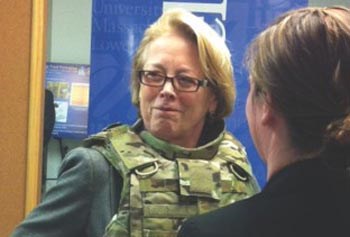UMass Lowell, Army Lab Researchers Collaborate to Help Keep Soldiers Safe

U.S. Rep. Niki Tsongas, at UMass Lowell Thursday, tries on body armor developed for female soldiers by researchers at UMass Lowell and the U.S. Army Natick Soldier Research, Development and Engineering Center.
02/08/2013
Lowell Sun
By Hiroko Sato
LOWELL -- U.S. Rep. Niki Tsongas once asked a soldier if he ever felt tempted to take off his heavy body armor.
He "sheepishly said, 'yes,' " Tsongas recalled.
From back pain to knee problems, countless troops suffer from the toll that heavy-duty gear can take on their bodies. But men and women in uniform could soon have an easier time fighting for their country, thanks to UMass Lowell researchers and their counterparts from the U.S. Army Natick Soldier Research, Development and Engineering Center.
The university's mechanical engineering team's technology for the analysis of textile structure could help make body armor stronger and lighter. Plastics engineers at the Natick lab can use the super-high-speed polymer mixer to study with UMass Lowell researchers better ways to package portable food. Photo-voltaic experts from both institutions also want to develop efficient solar-battery chargers that soldiers can fold up like a picnic blanket and carry.
The collaboration among these researchers adds to the growing spectrum of research projects at UMass Lowell, said university Chancellor Marty Meehan.
"By achieving this critical mass of research, we are able to help troops and save lives," he said.
In a campus ceremony Thursday, UMass Lowell and Natick lab announced their partnership for various research projects. The collaboration, called "Harnessing Emerging Research Opportunities to Empower Soldiers (HEROES)," aims to find ways to better ensure soldier safety, ranging from flame-retardant camouflage to lighter food-packaging materials to improved body armor for female soldiers.
The partnership will provide the Natick center access to the cutting-edge lab equipment at UMass Lowell's new Emerging Technologies and Innovation Center while allowing researchers from both institutions -- whom Tsongas calls "the best research-and-development minds of New England" -- to exchange their expertise and ideas.
The university also hopes to secure business partners for commercial applications of the developed technologies. That would be an ideal scenario for the Emerging Technologies and Innovation Center, which features a plastics lab where manufacturers can test technologies for mass production, said Julie Chen, vice provost for research at the university.
The HEROES project is partly the culmination of Tsongas' initiative to help improve the lives of men and women in uniform by using local expertise. The Lowell Democrat, who serves on the House Armed Services Committee and has visited soldiers serving around the world, said she has witnessed how technology and frontline duties go hand in hand. As the number of female soldiers grows, developing armor that fits their bodies will also become more critical, she said.
Lt. Gov. Tim Murray said bringing the academic and business worlds together has been a cornerstone of the Patrick administration's economic strategy.
"In this particular instance, it protects those precious men and women" fighting to protect the country, Murray said.
It's all about protecting "our sons and daughters," said Jack Obusek, director of the Natick lab, who is a former soldier and father of a son serving in the military.
Army 1st Sgt. Brian Gemmill, who works for the Natick lab, said lighter armor helps troops move faster and farther. Technological advancement has already done quite a bit for soldiers, he said, but research can never end to keep improving products.
Jim Sherwood, co-director of Advanced Composite Materials and Textiles Laboratory at UMass Lowell, said his team will try to understand how blasts from explosives cause textiles to tear at the fiber level. That will help make lighter and stronger armor, he said.
